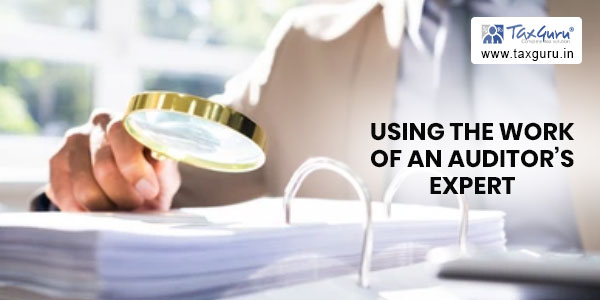An expert is a person, firm or other association of persons possessing special skills, knowledge and experience in a particular field other than accounting and auditing. There can be four type of such experts :-
- Engaged by the client
- Engaged by the auditor
- Employee of the client
- Employee of the Auditor
Even if an expert is employed by the auditor while using his work it should not be used as work done by auditor’s assistant, rather it should be tested as work done by an expert.
ISA 500, Audit Evidence Stipulates that if the information to be used as evidence has been prepared using the work of a management’s expert then :
- Evaluate the competence, capabilities and objectivity of the expert
- Obtain an understanding of the work of that expert
- Evaluate the appropriateness of that expert’s work as audit evidence for relevant assertion
In simple words if financial statements are prepared on the basis of experts work in those cases auditor has to guide himself as above.
ISA 620 (Using the work of an Auditor’s Expert), says auditor’s expert is : “An individual or organization possessing expertise in a field other than accounting or auditing, whose work in work in that field is used by the auditor to assist the auditor in obtaining sufficient appropriate audit evidence. An auditor’s expert may be either an auditor’s internal expert (Part of audit firm) or an auditor’s external expert (hired from outside by auditor)’
Auditors do need to employ their own expert in order to decrease the risk that material misstatement will not be detected. Even if an expert is employed by the auditor while using his work it should not be used as work done by auditor’s assistant, rather it should be tested as work done by an expert.

Expert may be employed by auditor in following areas :-
- Valuation of certain type of assets – Land and buildings, Plat and Machinery, Jewellery, Work of Art, Antiques, Intangible Assets – Patents, trademarks etc., Environmental Liabilities, Site clean up costs.
- Determination of Quantities or physical condition of assets, for example – Minerals, Petroleum reserves, Gas reserves etc.
- Actuarial Calculation of liabilities like – Insurance Contracts and Employee Benefit Plans
- Measurement of work completed and to be completed on contract in progress for revenue recognition.
- Legal Opinion for – Interpretation of contracts, laws and regulations.
- Analysis of complex or unusual tax compliance issues.
An auditor’s expert needs to be competent, capable and objective if their services are to be deemed adequate for the audit purpose.
Competence – This relates to the nature and level of expertise of the expert. Any expert employed should have a widespread recognition of expertise in their discipline.
Capability – It is related with the expert’s ability to exercise that competence in the circumstances of audit engagement. Example – expert must have resources to perform the task in hand.
Objectivity – It is related with the possible effects that bias, conflict of interest or the influence of others may have on the judgment of the expert. If an expert has a vested interest in expressing anything other than objective opinion with regard to the subject matter, then their opinion will be of no value to the auditor.
Information as to competence, capability and objectivity may be sought from sources like :
- Personal experience with previous work of expert
- Discussion with the expert
- Discussion with other auditors who are familiar with the expert’s work
- Knowledge of expert’s qualifications, membership of a professional body or industry association, license to practice or other forms of external recognition
- Published papers or books written by experts
If competence, capability or objectivity is compromised then while using the work of expert, chances of misstatement and errors will remain with the information.
The auditor should seek reasonable assurance that the expert’s work constitute appropriate audit evidence in support of the financial information, by considering –
- The source data used – auditor can seek information from expert as to how he has satisfied himself that source data are sufficient alternatively he may also conduct audit procedure on data for assurance of it’s sufficiency, relevance and reliability.
- The assumption and methods used and if appropriate their consistency with the prior period
- The result of expert’s work in the light of overall knowledge of auditor
To evaluate the findings and conclusions of the auditor’s expert, auditor may carry out various procedures like :
- Inquiries of the auditor’s expert
- Reviewing the auditor’s expert’s working paper and reports
- Corroborative procedures such as :
- Inquiries of the auditor’s expert work
- Examining reputable statistical and other published data
- Confirming relevant matters with third parties
- Performing detailed analytical procedures and
- Re performing calculations
- Discussion with another expert with relevant expertise
- Discussing with auditor’s expert report with management
If the auditor concludes that the work of the auditor’s expert is not adequate for the auditor’s purpose and auditor cannot resolve the matter, he may either ask the expert to carry out further work or he himself may opt to carry out additional audit procedures as appropriate.
Work of an Expert and Auditor’s Report : If after performing all procedures the auditor concludes that :
- The work of the expert is inconsistent with the information in the financial statements, or
- The work of expert not constitute sufficient audit evidence
He may opt for Qualified opinion, Disclaimer of opinion or Adverse opinion as the case may be.
Reference to an Expert in the Audit Report : In case of Unqualified opinion auditor should not refer to the work of an expert in his report. If as a result of audit procedures auditor decides to express other than an unqualified opinion, it may in some circumstances, in explaining the nature of his reservation, refer to or describes the work of an expert. Where in doing so, the auditor considers if appropriate disclose the identity of the expert. In those cases auditor should obtain prior consent of the expert for such disclosure.





